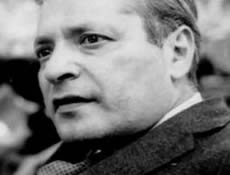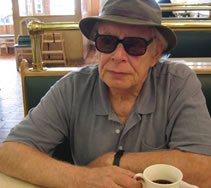A storied legacy
Decades before the M.F.A. Program in Creative Program was established, SU was a hotbed of literary talent. Maybe Stephen Crane was onto something.

In 1963, the wooden stairs throughout the four floors of the Hall of Languages were worn curved and slick from students and faculty pounding up and down to classes and offices for the 90 years since the building’s dedication in May 1873. The footfalls of Stephen Crane in 1891 helped wear the grain, although, at the time, he was more noted for his contributions to the SU baseball team than for the talent that would lead him away from college and into his passion of writing. Crane is the first of a long legacy of noted writers who have taught and/or studied at the University.
By the 1920s, SU was attracting some of the best scholars in English letters, including Leonard Brown, a literary critical theorist who has been acknowledged as the first to apply the theories of Sigmund Freud and the economic and social philosophies of Karl Marx to scholarly inquiry and his teaching practice. In the first wave of fearful reaction to Marxist theory and perhaps Freud’s thoughts on human sexuality, the University relieved Brown of his post in the 1930s in objection to his views, which weighed heavily in his classroom lectures. His dismissal, however, was short-lived, due to a report in the local paper, and, the following day, he resumed his classes, continuing for another 30 years in the English department. Brown, in his scholarly endeavors, connected with writers and literary critics throughout the nation, with a list of colleagues and friends that included Ernest Hemingway; Malcolm Cowley; Saul Bellow; Joseph Campbell; Shirley Jackson ’40; and Delmore Schwartz, who would later join the Syracuse faculty and famously mentor Lou Reed '64.
Harlow W. Waite was another of the esteemed English faculty member, as the department made its mark on American literary criticism from the 1930s through the ’50s. He and Benjamin P. Atkinson co-authored Literature for Our Time: An Anthology for College Students, a remarkable collection that was one of the first to include both popular material and classical literature, which, at the time, was considered quite radical. They followed up with another anthology, Poetry from Literature for Our Time, with both books proving to be timeless, available readily online to this day.
In 1946, Walter Sutton joined the faculty, later to be named Distinguished Professor of Humanities, director of graduate studies, and then chair of the English department in the first half of the 1970s. Another addition to the English department in the 1940s was Donald Dike, a Columbia University graduate who taught at SU well into the later part of the 20th century. Dike offered an address for the dedication of Bird Library in 1973, in which he cited his colleague and friend, Leonard Brown, as a trendsetter in criticism.
Brown became one of the two forces on campus to address the need to develop what would become one of the first creative writing programs in the country. Dike was the second.

By the late ’50s, Brown and Dike created a summer intensive program for approximately 15 creative writers, the precursor to the program they aimed to establish. According to Jacobs, Brown wanted SU to "extend a welcome mat to talented writers, blending pop culture with high culture.” It also provided an experience not offered by the traditional academic program.
Jacobs also remembers Dike handing him an undergraduate’s manuscript that he found remarkable. “Leonard said, ‘This girl is writing a novel a month; she’s going to be a huge writer,’” Jacobs recalls. That young writer was Joyce Carol Oates ’60, H’00.
Jacobs returned to campus to teach in the summer seminar in 1958 and 1959, having started to make a name for himself in the growing genre of what is now called speculative fiction, while working at ABC television in New York. In these informal sessions, participants sat around a table and examined work by noted writers, as well as workshopped their own creative endeavors, much like the graduate workshops now part and parcel of the English department’s MFA program. Jacobs went on to develop a rich writing career in both fantasy fiction and mainstream literature, keeping apace with Kurt Vonnegut, Stanley Elkin, and Paul West.
The national reach to include talented writers in the summer program was built upon the reputation of Brown and Dike, who were connected with so many of the names who have become institutions in American literature: Cowley, Hemingway, and Bellow, to name a few. Jacobs tells of the conflict between Brown and Hemingway, when the former had been invited to write the introduction to Hemingway’s collected stories. Unfortunately, Hemingway did not appreciate Brown’s candor and pulled the essay, assigning the introduction to Edward Hocher. Brown returned his advance to the publisher.
Brown and Dike had a vision that creative writing would become as significant a movement as literary scholarship, and they wanted SU at the forefront of that growth. Jacobs remembers Brown as being acerbic but brilliant. Of Dike, he says, “In terms of engagement with students, Don was a leader, a major force.”
The two partnered to create the platform for a creative writing graduate program that has become one of the best in the nation. It was not a popular notion with the administration at the time, but they made their argument and finally achieved their goal of approval. Dike convinced Schwartz to teach in the new program, and his reputation helped place SU at the forefront, in spite of his short tenure on campus.
Since those early years, many noted writers have been affiliated with the Creative Writing Program, including Donald Justice, W.D. Snodgrass, Philip Booth, and Raymond Carver. In his recent visit for the reading series named in honor of Carver, Stephen Dunn G’70 spoke of studying with Justice and his demands of the writers in his classes. Dunn, himself, is among those who have achieved national acclaim as both writer and teacher, earning a 2001 Pulitzer Prize in poetry.
The list of faculty and graduates from the past 50 years is worthy of its own anthology of American literature. Fiction and poetry alike, there is a consistent history of achievement in publication and honors, with the most recent being the acclaim that George Saunders G’88, himself a graduate of the program in which he teaches, has garnered with his newest short story collection, Tenth of December (Random House, 2012). The creative writing faculty continues to offer the best to young writers and sustains the vision of two professors who long ago understood that creative writing was as valuable to scholarship as critical analysis. Brown and Dike would likely marvel at the reconstructed interior of their beloved Hall of Languages and be pleased to learn their assumptions proved correct. They would be honored to know they seeded a program that not only sustains, but also provides the best of the next generation of literary artists the opportunity to hone their craft.
Contributing writer Georgia Popoff is an award-winning poet and artist-teacher who also serves as managing editor of The Comstock Review (Comstock Writers' Group) and as a faculty member and the workshops coordinator of the Downtown Writers Center, part of the YMCA Arts Branch. She resides in Syracuse, NY.
Media Contact
Rob Enslin
